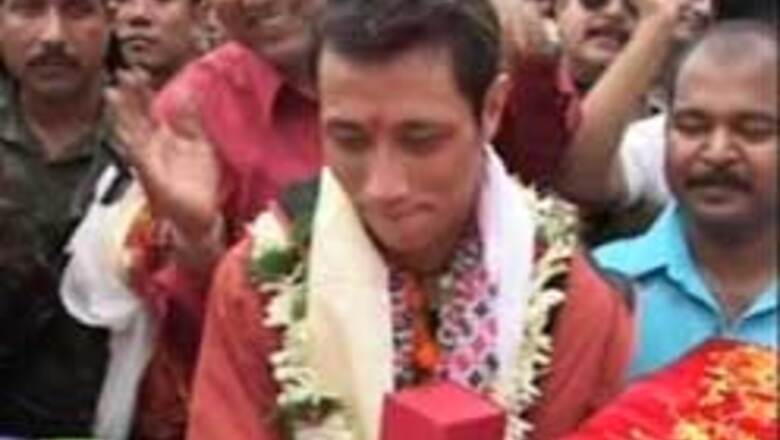
views
Darjeeling: India's Northeast hills have come alive with fresh demands for a separate state within India for the Gorkha people, with protests threatening the area's renowned tea and tourism industries.
Bizarrely, it was a television talent show Indian Idol, India's version of American Idol, that lit the fire of Gorkhaland last September, two decades after the end of a insurgency among ethnic Nepalis in eastern India that left more than 1,200 people dead.
Frenzied canvassing for a local boy, ethnic Nepali or Gorkha policeman Prashant Tamang, metamorphosised into a political upsurge that has ushered in a new king of the hills.
Politician Bimal Gurung surfed the wave of ethnic pride unleashed by the TV contest and now is hoping it will carry his people towards Gorkhaland, the separate state carved out of West Bengal they have been demanding for many decades.
"This is the last fight," the 44-year-old Gurung told Reuters in an interview in his party office in Darjeeling.
"Till the last drop of my blood, I will fight this battle until we have a Gorkhaland state for the Gorkhas." The green, white and yellow flags of Gurung's Gorkha Janmukti Morcha (Gorkha People's Liberation Front) fly from homes, shops and cars all around Darjeeling and nearby towns, bunting criss-crosses above the main streets.
The party's symbols are the sun, the Himalayan mountains and two crossed kukris, the heavy, curved knife used by the famously fierce Gorkha soldiers from Nepal and India who have long fought with both British and Indian armies.
On a windy hilltop by the town of Kurseong, an obelisk crowned by a huge kukri commemorates the "martyrs" of the 1980's insurgency, which formed the backdrop for Kiran Desai's Booker Prize-winning novel The Inheritance of Loss.
But Gurung insists his will be a peaceful struggle. "We want the right of self-determination within the Indian constitution," he said. "We would not like to repeat the violence of 20 years ago.
All protests will be held in a democratic and peaceful manner." Peace broke out in 1988 when Gorkha champion leader Subhash Ghising compromised with New Delhi, accepting limited autonomy under a new Darjeeling Gorkha Hill Council, which he then led.
Two decades on, Gurung says Ghising betrayed the cause, and complains the Gorkha people are still neglected, pointing to the appalling state of roads, water and public services in the hills. His chance came when Tamang sang his way into the final stages of Indian Idol.
Stoking Gorkha pride, Gurung raised huge sums of money to finance a mass SMS campaign which saw the local boy win first prize. When a Delhi FM radio DJ mocked Tamang as a "chowkidar" or caretaker, a common term of abuse for people from India's northeast, the fire was well and truly lit.
PAGE_BREAK
Prashant Fan Clubs were transformed into GJM offices, their members inducted into Gurung's ranks and the Gorkhaland cause.
The 74-year-old Ghising had seemed indifferent to the Tamang phenomenon, and was completely wrong-footed. His support suddenly evaporated and after more than 20 years in charge, he resigned from the Hill Council this month.
Geo-Politically Sensitive
Frequent strikes in favour of Gorkhaland this year have badly undermined tea and tourism industries, business leaders say. Now, Gurung promises an intensified non-cooperation movement from April 1, including the non-payment of taxes and an economic blockade to stop timber being exported from the hills
But he says strikes will be kept at a minimum for a few months so as not to disrupt the tourism industry that so many of his supporters depend upon during the peak spring season.
"During the 1980s things were so bad we lost Darjeeling as a brand in the eastern Himalaya," laments Raj Basu, president of the Eastern Himalaya Travel and Tour Operators Association."
"With a lot of effort, we had started getting our tourism charm back," he said. "Then the agitation started. Fortunately they have confirmed that tourism won't be affected."
But Rajiv Lochan, secretary of the tea traders association in the nearby town of Siliguri, is not so sanguine. He says the fine tea plantations of Darjeeling are already suffering.
"These so-called leaders have made people think too much, giving them all these dreams," he said.
"Things have regressed by 25 years, and because people are looking for something they are not going to get, they are getting more and more frustrated." Marcus Dam, Kolkata editor of the Hindu newspaper, says the protests may continue for some time, but India is unlikely to give way "in the near future". The area lies on or close to the borders of China, Nepal, Bhutan and Bangladesh, making it geo-politically very important. New Delhi will also be wary of the encouraging pan-Nepali sentiments which are sweeping across the region and encompass Sikkim.
"Central leaders are quite conscious of the sensitivity of the matter," Dam said. "But because of the language issue and geopolitics, it (Gorkhaland) won't happen in the near future."




















Comments
0 comment